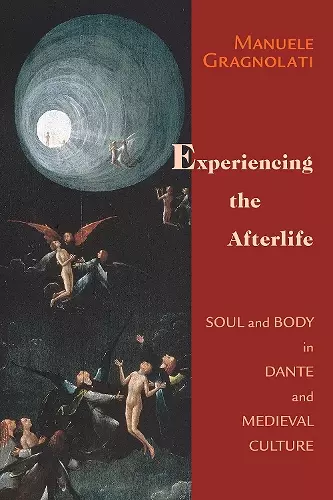Experiencing the Afterlife
Soul and Body in Dante and Medieval Culture
Format:Hardback
Publisher:University of Notre Dame Press
Published:15th Aug '05
Currently unavailable, and unfortunately no date known when it will be back
This hardback is available in another edition too:
- Paperback£26.99(9780268029654)

Experiencing the Afterlife provides the first sustained analysis of popular, vernacular depictions of the afterlife written in Italy before the Divine Comedy by authors such as Uguccione da Lodi, Giacomino da Verona, and Bonvesin da la Riva. Manuele Gragnolati uses his readings of these poets to provide a new interpretation of Dante's work. Combining elements from several disciplines, he investigates the richness of high medieval eschatology and the concept of personal identity it expresses. Gragnolati is particularly concerned with how the notions of body and pain characteristic of medieval spirituality and devotion inform the eschatological representations of the time, especially in their paradoxical urge to stress at once the physical experience of the separated soul and the final necessity of bodily resurrection.
By integrating lesser-known texts and scholarship from other disciplines into the specialized field of Dante studies, Gragnolati sheds new light on some of the most vigorously debated and crucial questions raised by the Divine Comedy, including the embryological discourse of Purgatorio 25, the relation between the soul's experience of pain in Purgatory and the devotion that late medieval culture expressed toward Christ's suffering, and the significance of the audacious vision of resurrected bodies that Dante the pilgrim enjoys at the end of his journey. At the same time, Gragnolati brings these questions back into contemporary discussions of medieval eschatology and opens new perspectives for current and future work on embodiment and identity. Scholars and students of Dante and Italian studies, as well as those in medieval history, religion, culture, and art history, will be rewarded by the fresh insights contained in Experiencing the Afterlife.
"Experiencing the Afterlife studies the ontological status and value of the human body in thirteenth- and fourteenth-century Italy, in formal theology, in high literary culture, and in more popularizing literature. . . . This book makes a valuable contribution to Dante studies, medieval studies, Italian cultural and literary history, and the history of theology. Each new publication in the Devers Series in Dante Studies is a cause for celebration, and Experiencing the Afterlife is a superb addition." —Church History
"In his fine book, Manuele Gragnolati expertly explores the many issues and tensions that shaped the connections between grave, body, soul, and immortality. . . . Gragnolati's analyses provide a cultural context for the central innovation in Dante's vision of eschatological experience: the soul's generation of an aerial body when the fleshly body dies. . . . Wide-ranging yet precisely focused, Experiencing the Afterlife is an excellent companion to the other thought-provoking volumes in Notre Dame's Devers Series in Dante Studies." —Speculum
"Manuele Gragnolati's lively and engaging book shines new light on the debate about the role of the body in the Divine Comedy's conception of personal identity . . . an illuminating analysis of a theme central to the Divine Comedy. It is, in short, an important contribution to Dante scholarship." —Medium Aevum
"Gragnolati's book draws an elaborate, far-fetched parallel between Dante's work and that of Bonvesin da la Riva, a popular poet whose visions of the afterlife foreshadowed Dante's."—Los Angeles Times Book Review
"Most impressive are the careful and innovative readings of largely undervalued texts by writers such as Uguccione da Lodi and Giacomino da Verona. Gragnolati skillfully uses these works, which express popular attitudes in early modern Italy about the materiality of the afterlife, to balance and further illuminate the more familiar pronouncements of medieval scholastic philosophers...Highly recommended." - Choice
ISBN: 9780268029647
Dimensions: 229mm x 152mm x 21mm
Weight: unknown
298 pages